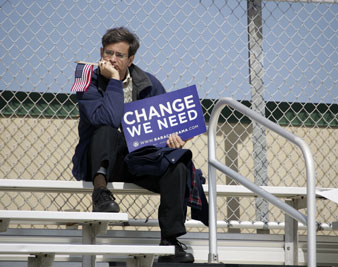 AP ImagesMany Democrats are concerned that the early promise of the Obama administration has given way to the politics of triangulation.
AP ImagesMany Democrats are concerned that the early promise of the Obama administration has given way to the politics of triangulation.
After his brilliant beginning, the president suddenly looks weak and unreliable. That will be the common interpretation around Washington of the president’s abrupt retreat on substantive heathcare reform. Give Barack Obama a hard shove, they will say, rough him up a bit and he folds. A few weeks back, the president was touting a “public option” health plan as an essential element in reform. Now he says, take it or leave it. Whatever Congress does, he’s okay with that.
The White House quickly added confusion to the outrage by insisting the president didn’t really say anything new. He’s just being flexible. He still wants what most Democrats want–a government plan that gives people a real escape from the profit-driven clutches of the insurance companies. But serious power players will not be fooled by the nimble spinners. Obama choked. He raised the white flag, even before the fight got underway in Congress.
He hands the insurance industry a huge victory. He rewards the right-wing frothers who have been calling him Adolph Hitler or Dr. Death. He caves to the conservative bias of the major media who insist only bipartisan consensus is acceptable for big reform (a standard they never invoked during the Bush years). Obama is deluded if he thinks this will win him any peace or respect or Republican votes. Weakness does not lead to consensus in Washington. It leads to more weakness. The Party of No intends to bring him down and will pile on. Obama has inadvertently demonstrated their strategy of vicious invective seems to be working.
Barack Obama mainly did this to himself. To avoid the accusation of socialized medicine, he intentionally shrouded his objectives in bureaucratic euphemisms like “public option.” What the hell does that mean? It doesn’t mean anything. The vagueness allowed anyone to fill in the blanks and anxious people did so in apocalyptic ways. The original idea, after all, was making something similar to Medicare available to anyone between childhood and old age who was either shut out by high prices or abused by insurance companies policing the system. This approach–call it Medicare Basic–would in theory give government the greater leverage needed to control the price inflation and reshape the system in positive ways. If you told people “public option” was a Medicare equivalent, the polls would demonstrate the popularity. Instead, that objective is now at risk. The right still calls Obama a covert socialist.
Popular
"swipe left below to view more authors"Swipe →
There is a more cynical interpretation of Obama’s flexibility. He is coming out right about where he wanted to be. Forget the good talk, it is said, this president never really intended to do deep reform that truly alters the industrial power structure dominating our dysfunctional healthcare system. He just wanted minimalist reforms he could sell as “victory.” Not until years later would people figure out that nothing fundamental had been changed.
In this scenario, Obama has always been more comfortable with the center-right forces within the Democratic party–Senator Max Baucus and the Blue Dogs–and the Clintonistas of DLC lineage who now fill his administration. His real political challenge was to string along the liberals with reassuring talk until they were stuck with lousy choices– either go along with this popular president’s pale version of reform or take him on and risk ruining his presidency. This sounds a lot like the choices Democrats faced during the Clinton years. Candidate Obama said it was “time to turn the page.” We are still waiting to see what he meant.
I do not subscribe to the manipulative, deceptive portrait (not yet), but you can find lots of supporting evidence in Obama’s behavior. His response to the financial crisis demonstrates a clear desire to restore Wall Street power, not to change it. His war strategy in Afghanistan looks like the familiar trap of open-ended counterinsurgency. The trap may soon close on him when the generals announce their need for more troops. Will this president dare to say no? Obama negotiated a truly ugly deal with the pharmaceutical industry–a promise not to use government bargaining power to bring down drug prices. His lieutenants still yearn to demonstrate “fiscal responsibility’ by taxing the health-care benefits of union members or whacking Social Security.
In other words, this is really a decisive test for the Democratic party and its main constituencies. Will they go along with the president or push back and reject his misdirections? The burden will fall mainly on Speaker Nancy Pelosi and the House majority. They will be under intense pressure from the White House to stay “on message” with the president. Organized labor seems to be breaking out of the go-along passivity. Richard L. Trumka, soon to be president of the AFL-CIO, promises to blackball Blue Dogs or anyone else who double-crosses the working people who faithfully financed their election campaigns.
Taking the high road will be hard and divisive. But maybe this is at last the season when Democrats reveal which side they are on.


